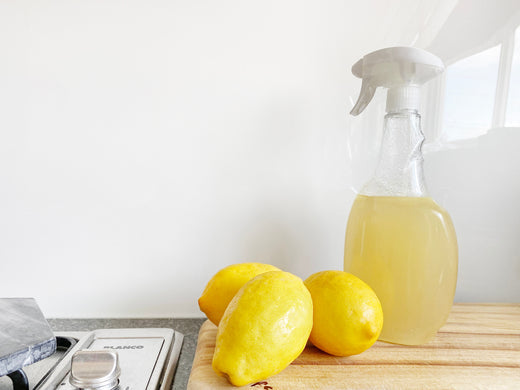Natural Drain Cleaners: 5 Safe Options For Your Home

Are you looking for a natural drain cleaner that works on clogs without extensive plunging, coat-hanger acrobatics, or other dirty work?
They do exist! And even better, they can be made using everyday household items , you likely already have on hand.
In this article, you’ll learn about five natural drain cleaners that dissolve and dislodge those pesky clogs without damaging pipes or your lungs.
At Branch Basics, we believe in safer, healthier products for your home- your drains included! By choosing natural alternatives, you’re making a choice that benefits both your space and the planet. Whether you’re dealing with a slow drain or a stubborn clog, we’ve got you covered with simple, effective solutions. Let’s dive into your options.
Why Opt For A Natural Drain Cleaner?
Drain cleaners are incredibly dangerous chemical concoctions that kill and injure thousands of children, adults, and pets every year. It’s a wonder they are approved for household use.
What makes them so poisonous?
The main ingredient, sodium hydroxide, is so caustic that ingestion can cause:
- Burning of the mouth, esophagus, and stomach
- Internal tissue damage
- Extreme abdominal pain
- Difficulty breathing due to throat swelling
- A rapid drop in blood pressure
- Collapse
- And even death
Then there are the fumes, which can cause respiratory damage and extreme illness.
Skin exposure can cause severe burns, eye exposure can cause vision loss, and it’s also incredibly toxic to the environment and aquatic life.
Many drain cleaners also contain bleach, which creates additional toxic fumes in the form of chloramine gas when combined with organic matter (such as everything that creates a clogged drain!).
Finally, most plumbers recommend avoiding chemical drain cleaners, as their caustic chemicals can damage your pipes.
Ultimately, conventional drain cleaner is a hazardous poison and environmental hazard that is completely unnecessary and has no place in a safe and healthy home (especially homes with small children and pets).
What Are Natural Drain Cleaners?
A natural drain cleaner combines non-toxic products that work together to dissolve clogs and force them out of the pipes using pressure.
For example, you create a chemical reaction that dissolves the clog by combining non-toxic baking soda (a base) with a natural acid, such as vinegar or lemon juice.
Following that up with a good rinse of hot or boiling water creates pressure, which drives the clog down the drain.
Unlike commercial, chemical-based drain cleaners (which are some of the most toxic and poisonous products around), natural drain cleaners contain no harmful chemicals, do not produce caustic fumes, and will not damage your pipes.
1. Baking Soda And Vinegar
Our favorite natural drain cleaner combines baking soda and vinegar with hot water.
Here’s how to use this non-toxic combo to dissolve and dislodge clogs:
- Pour a few tablespoons of baking soda down the drain
- Follow with a cup of vinegar
- Let fizz for about 10 minutes
- Rinse with hot or boiling water*
*Got PVC pipes? Skip the boiling water and opt for hot water instead, as boiling water could damage PVC piping. If you’re unsure, go with hot or very warm water. It may take a few extra passes, but it’s better than damaging your pipes.
Is the clog still not loosening after 1-3 tries? If so, some plunging and/or drain clearing may be required.
This isn’t pleasant work, but avoiding toxic drain cleaner…or expensive plumbing bills is worth it.
In this case, plunge or use a coat hanger or drain cleaning tool to loosen and remove as much build-up as possible. Follow with the baking soda vinegar protocol to completely clear the clog and clean and deodorize your drain.
2. Baking Soda + Lemon Juice
If you’re out of vinegar, lemon juice will do the same job while imparting a lovely scent to your drains.
To use lemon juice and baking soda as a natural drain cleaner:
- Pour a few tablespoons of baking soda down the drain
- Follow with a cup of lemon juice
- Let fizz for about 10 minutes
- Rinse with hot or boiling water (non-PVC pipes only for boiling water)
As noted in the previous section, some plunging or dislodging may be required for tough clogs in addition to the lemon juice and baking soda.
3. Biological Enzyme Cleaners
For those who want a pre-made natural drain cleaner, biological enzyme drain cleaners, also known as “bio cleaners,” are a safer option.
These cleaners contain natural enzymes that will eat away at clogs without damaging your drains or releasing toxic fumes.
When looking for a non-toxic biological drain cleaner, be sure to look for drain cleaners that are:
- Human safe not just environmentally safe, this means they are rated at least a “B” or “B+” on EWG
- Fragrance-free
- Biodegradable
- Free of harmful chemicals
- Safe for all types of pipes and septic systems
Recommended brands are limited (unfortunately, even many of the “natural” drain cleaners scored “Ds” or “Fs” from EWG) and include:
- Drainbo The Natural Solution Natural Drain Cleaner, rated B+ by EWG
- Biokeleen Bac-Out Drain Care, rated B+ by EWG
Wondering if a particular drain cleaner brand measures up to its sustainable claims? Check its rating on EWG’s Cleaning Product database here.
4. Cola
In our opinion, drain cleaning is the only appropriate use for mainstream, corn-syrup, sugar-, artificial sweetener- and caramel-color-laden Cola.
So, when a well-meaning friend or relative brings you a big bottle or six-pack of Cola, thank them; then discreetly store it in the cleaning closet for when clogged drains beckon.
In general, cola, and other types of sodas, work best on minor clogs.
The reason they work is the carbonation creates pressure, while the other ingredients have a caustic dissolving effect on the clog (what a very good reason NEVER to put traditional cola in your body!).
To use cola to remove a clog or prevent clogs, pour at least 2 cups of Cola down the drain and let stand for at least 15 minutes.
Rinse with hot water and repeat as necessary.
5. Salt + Borax or Sodium Sesquicarbonate Vinegar
Many toxin-conscious families keep Borax or Sodium Sesquicarbonate around the house for use as natural pesticides (Borax) or laundry products.
What’s the difference between the two?
Borax is a mineral product rated “5” on the EWG SkinDeep Database. It’s also been banned in Europe due to concerns with toxicity.
Sodium Sesquicarbonate is considered a Borax substitute in Europe because it has a similar chemical makeup. It is rated “1” on the EWG database.
So, which should you use? It depends on the job.
We keep Borax around for use as a natural pesticide because we’ve found it works better than Sodium Sesquicarbonate and is far better than using synthetic pesticides.
However, we’d recommend choosing Sodium Sesquicarbonate over Borax for all other uses whenever possible.
For drain cleaning, either can work, so make the choice that works for you.
To use:
- Mix 1/4 cup salt with 1/4 cup borax or Sodium Sesquicarbonate in a large bowl.
- Slowly add in about 1/2 cup distilled white vinegar.
- Wait for the chemical reaction/fizzing to take place, taking care not to inhale (vinegar and borax can cause irritation in some people).
- Once it’s done fizzing, pour it slowly down the drain.
- Let stand for 20-30 minutes.
- Rinse with hot water.
- Repeat as-needed.
For tough clogs, additional plunging or use of a clog removal contraption may be necessary.
Toss the Toxins With Branch Basics
Has this article got you thinking about what other chemicals may be lurking in your conventional or “green” cleaning products? If so, you’re in the right place.
Branch Basics was created as an all-in-one, human-safe, completely natural cleaning product designed to replace every cleaning and laundry product in your home.
As healthy home experts, we’re also passionate about sharing the latest science and information about how to toss the toxins to create a healthier home.
To learn more about Branch Basics products, check out our Starter Kits.
For more information on natural cleaning, nutrition, clean beauty, natural parenting and baby care, and more, check out our Blog, Podcast, and Toss The Toxins Online Course.
Natural Drain Cleaner FAQ’s
Have more questions about natural drain cleaners? Let’s dive in.
How effective are natural drain cleaners compared to chemical ones?
Natural drain cleaners can be just as effective as chemical cleaners, without damaging your pipes.
As noted above, if non-toxic products aren’t enough to move the clog, you’ll need to use a plunger and/or drain-clearing contraption, such as a snake to clear the drain.
With these methods and tools at-hand, you should never need a chemical drain cleaner. And if you do, it’s probably time to call a plumber vs. risk ruining your pipes or polluting your home.
Can I use natural drain cleaners on all types of pipes and drains?
You can use any of the methods listed here on any type of pipe, provided you do not pour boiling water down PVC pipes.
If using an enzymatic- or bacterial-based drain cleaner, check the manufacturer's instructions to ensure it is appropriate for your pipes.
How often should I clean my drains?
An ounce of prevention is worth a pound of cure when it comes to clogs.
To prevent clogs from becoming a nuisance (or worse), we recommend cleaning your drains at least once a month and using a drain sieve to prevent things like food particles, hair, etc. from getting caught in your drains.

Marilee Nelson
Marilee Nelson is an Environmental Toxins expert who has spent nearly 30 years advocating for the chemically-sensitive and chronically-ill. She is a Board Certified Nutritionist, Certified Bau-Biologist and Bau-Biology Inspector and specializes in Food As Medicine. She has helped thousands of families and individuals identify, heal and recover from toxic exposures and is on a mission to revolutionize the way American families view their health.








